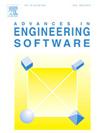Implementation of a three-dimensional numerical model for the filling process in Liquid Composite Molding on polyhedral meshes
IF 4
2区 工程技术
Q2 COMPUTER SCIENCE, INTERDISCIPLINARY APPLICATIONS
引用次数: 0
Abstract
In this paper, a three-dimensional, two-phase numerical model based on polyhedral meshes was developed to simulate the resin-filling process in Liquid Composite Molding (LCM). The Algebraic Volume of Fluid (VOF) method tracked the resin flow and the finite volume method (FVM) was applied for stable numerical discretization and solution. The numerical model was validated by unidirectional flow experiments, with the maximum error observed at the flow front being within 5.00 %. Subsequently, the performance of polyhedral meshes in LCM simulations was compared with that of hexahedral and tetrahedral meshes, following the mesh-independence analysis. The results show that the accuracy of the model using polyhedral cells is close to hexahedral cells and higher than tetrahedral cells. The cell number of polyhedral cases is about half that of hexahedral cases and a quarter to a third of tetrahedral cases, assuming similar computational accuracy and mesh size. Polyhedral meshes consume the least computational resources, slightly less than hexahedral meshes and approximately one-third of tetrahedral meshes. Furthermore, polyhedral meshes have a similar level of mesh generation to that of the tetrahedra and are better adapted to complex geometries. Numerical modeling utilizing polyhedral meshes is advantageous for large-scale and complex-shaped parts.
本文开发了一种基于多面体网格的三维两相数值模型,用于模拟液体复合材料成型(LCM)中的树脂填充过程。流体代数体积法(VOF)跟踪树脂流动,有限体积法(FVM)用于稳定的数值离散和求解。数值模型通过单向流动实验进行了验证,在流动前沿观察到的最大误差在 5.00% 以内。随后,根据网格独立性分析,比较了多面体网格与六面体和四面体网格在 LCM 模拟中的性能。结果表明,使用多面体单元的模型精度接近六面体单元,高于四面体单元。在计算精度和网格大小相似的情况下,多面体案例的单元数约为六面体案例的一半,四面体案例的四分之一到三分之一。多面体网格消耗的计算资源最少,略低于六面体网格,约为四面体网格的三分之一。此外,多面体网格的网格生成水平与四面体网格相似,更适合复杂的几何形状。利用多面体网格进行数值建模,对于大型和复杂形状的零件非常有利。
本文章由计算机程序翻译,如有差异,请以英文原文为准。
求助全文
约1分钟内获得全文
求助全文
来源期刊

Advances in Engineering Software
工程技术-计算机:跨学科应用
CiteScore
7.70
自引率
4.20%
发文量
169
审稿时长
37 days
期刊介绍:
The objective of this journal is to communicate recent and projected advances in computer-based engineering techniques. The fields covered include mechanical, aerospace, civil and environmental engineering, with an emphasis on research and development leading to practical problem-solving.
The scope of the journal includes:
• Innovative computational strategies and numerical algorithms for large-scale engineering problems
• Analysis and simulation techniques and systems
• Model and mesh generation
• Control of the accuracy, stability and efficiency of computational process
• Exploitation of new computing environments (eg distributed hetergeneous and collaborative computing)
• Advanced visualization techniques, virtual environments and prototyping
• Applications of AI, knowledge-based systems, computational intelligence, including fuzzy logic, neural networks and evolutionary computations
• Application of object-oriented technology to engineering problems
• Intelligent human computer interfaces
• Design automation, multidisciplinary design and optimization
• CAD, CAE and integrated process and product development systems
• Quality and reliability.
 求助内容:
求助内容: 应助结果提醒方式:
应助结果提醒方式:


